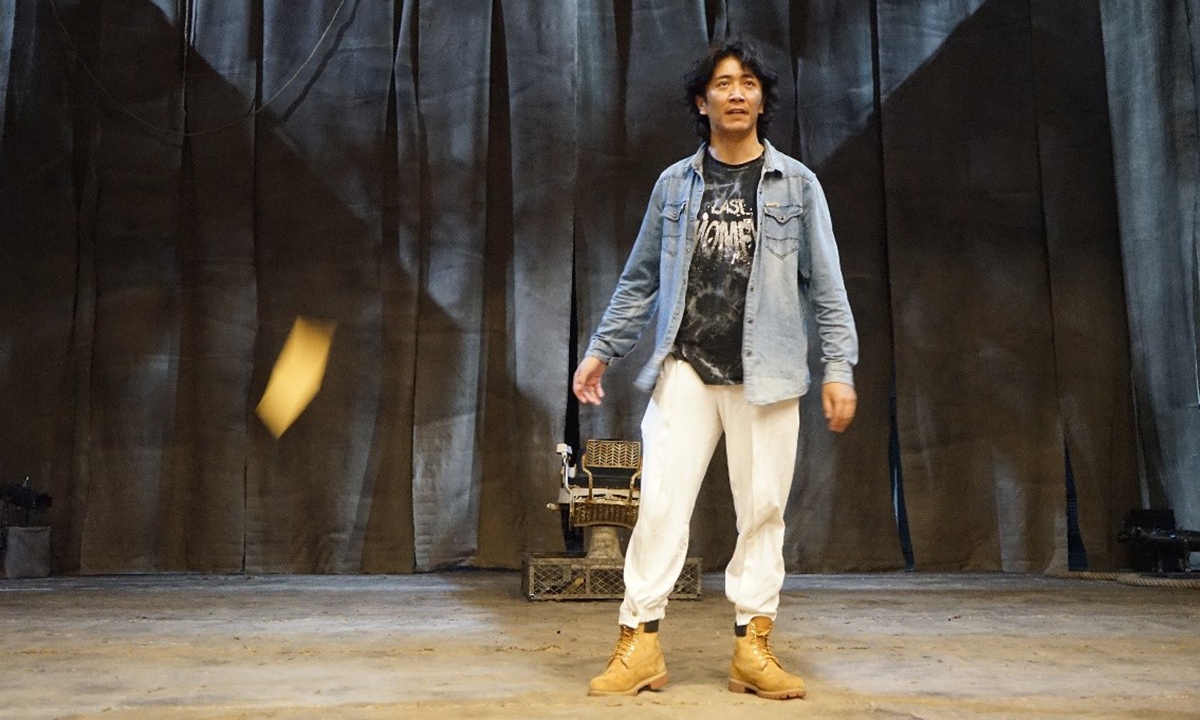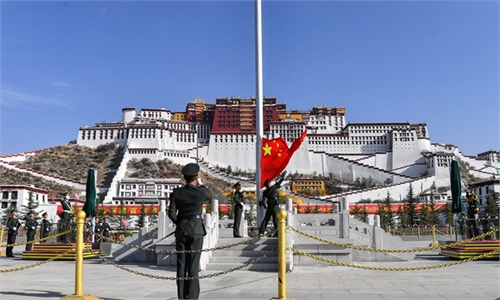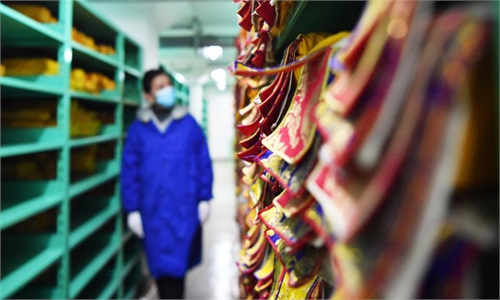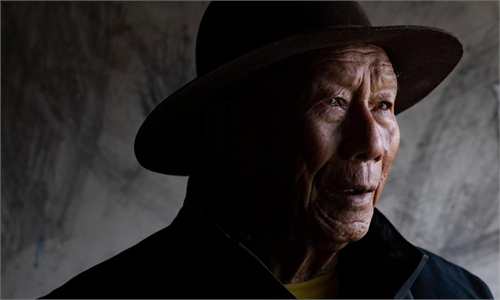ARTS / THEATER
Tibetan art students perform a version of Shakespeare's Hamlet in Tibetan language

Dondhrup Tsering, who plays the role of Hamlet, rehearses at the Shanghai Theatre Academy. Photo: Huang Lanlan/GT
"To be, or not to be, that is the question." Onstage, 22-year-old Dondhrup Tsering pronounced in Tibetan one of the most renowned lines in Hamlet, the language of his hometown, with great emotion. Following the line, Tsering performed Hamlet's long monologue with strong facial expressions and gestures, a highlight of one of William Shakespeare's greatest plays.
As a senior student of the Tibetan class of the Acting Department of the Shanghai Theatre Academy (STA), which only accepts students every decade, Tsering and his classmates have spent nearly two months learning and rehearsing Hamlet in both Putonghua and Tibetan for their graduation performance.
Directed by veteran theatrical actor Pu Cunxin, current Chairman of the China Theatre Association, the Putonghua and Tibetan versions of the drama are respectively given six and four public performances at the STA theater, from May 7 to 14, to mark the 70th anniversary of the liberation of Southwest China's Tibet Autonomous Region.
Tickets for all the shows have been almost sold out, STA told the Global Times on Tuesday.

A stage photo of Hamlet. Photo: Courtesy of the Shanghai Theatre Academy
'Amazing chemistry'
The Tibetan version of Hamlet is probably the first time a famous Western classic play is performed by young Tibetan artists in their ethnic language, which has created an amazing chemistry with this cultural fusion, Tsering, who plays the role of Hamlet, told the Global Times.
Tenzin Kungir, Tsering's classmate playing the role of Ophelia, also agreed. "Performing Western drama in Tibetan language is a novel and interesting experience to me," she told the Global Times, adding that the frank and extrovert personality of Ophelia is quite different from her and many other Tibetans who are usually introverted.
Kungir recalled a line that Ophelia said to his father: "He hath, my lord, of late made many tenders of his affection to me." She said that she feels shy each time she performs this part in Tibetan. "I feel that we Tibetans are relatively shy people. In real life, I seldom talk about love topics with my father."
This adaption of Hamlet is a meaningful exploration and a perfect cooperation between the national language (Putonghua) and an ethnic minority language (Tibetan), Jigme Wangtso, head of the Cultural Department of Tibet, mentioned at a seminar held on Sunday. The script of the Tibetan language version was translated by experienced Tibetan writers based on the accent of Lhasa, Tibet's capital city.
Pronunciation is a big challenge for the Tibetan class of 22 students who participate in the performance, said class tutor Yang Jia. Coming from various areas of Tibet, they speak various Tibetan dialects with different accents, she said.
Growing up in a border village in Tibet's Shannan city, Tsering said he spent a lot of time and energy in practicing the Lhasa accent. He exampled the first syllable of a word that is pronounced like the letter "T" in Lhasa accent but "D" in his Shannan dialect. "Like this one, our teachers helped correct our pronunciations word by word each day," he said.
Their months of efforts had paid off to some extent as Tsering recalled that in the previous performances, their Tibetan audience gave them direct feedback at the theater. "Seeing them laugh or keep silent, I felt that they could get the amusing or thoughtful pieces of the play," he told the Global Times.
'A present to motherland'
Starting from 1959, STA's Tibetan class recruits Tibetan students with talent in drama every 10 years to form them into successors and ambassadors of Tibetan art and culture. The current class performing Hamlet is its first four-year undergraduate class in acting, STA shared with the Global Times.
After four years of learning and training at the STA, Tsering said he has turned from an ordinary young man from Tibet's rural pasturing area into an art university graduate full of hope for the future. "I have received a lot of help from the government and I hope that I can perform the Tibetan version of Hamlet one day back in Tibet, as a present that we send to our motherland," he said.
According to the STA, Tsering and his classmates will perform Hamlet's Tibetan version on stages across China.
After graduation, Tsering said he plans to go back to Tibet and become a member of the local drama troupe. "I'm looking forward to perform on Tibet's stages the classic dramas of the West and China, as well as [elements] of my own ethnic group and explore more possibilities of cultural integration," he told the Global Times.




